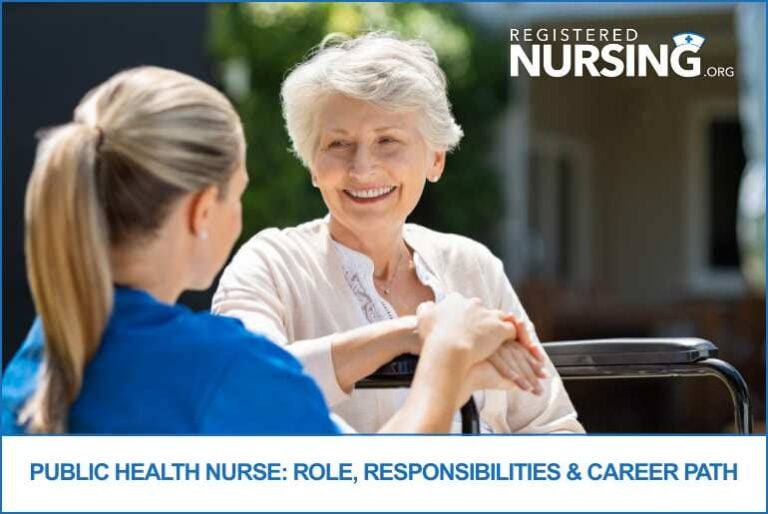Public Health Nurse: Role, Responsibilities & Career Path
- What Is a Public Health Nurse?
- Core Responsibilities of a Public Health Nurse
- Where Public Health Nurses Work
- Skills and Traits of Successful Public Health Nurses
- Steps to Becoming a Public Health Nurse in 2025
- Salary Expectations for Public Health Nurses in 2025
- Career Advancement Opportunities
- Why Choose Public Health Nursing?
- Challenges and Considerations
- Ready to Make a Difference?
- Sources
- Latest Articles & Guides

Public health nurses (PHNs) are playing an increasingly vital role in healthcare. In fact, the Bureau of Labor Statistics projects a 6% growth in nursing jobs from 2022 to 2032, with public health nursing gaining prominence due to its preventative focus. As healthcare systems pivot toward population health and prevention, the need for qualified public health nurses continues to rise.
Unlike traditional bedside nursing, PHNs work at the community level, helping reduce disparities, prevent illness, and empower individuals through education. Whether it's organizing immunization drives or advocating for underserved populations, these nurses are making tangible differences in people’s lives. For nurses looking to blend clinical skills with a broader societal impact, public health nursing offers a deeply rewarding path.
What Is a Public Health Nurse?
Public health nurses are registered nurses dedicated to improving population health through education, prevention, and intervention. Rather than focusing on individual patient care, they assess and address the health needs of entire communities. Their goal is to create healthier living environments and improve public well-being.
PHNs operate in a wide range of settings beyond hospitals. You might find them coordinating public health campaigns in schools, managing care in community clinics, or advising policymakers on health equity issues. Their work bridges the gap between clinical care and public service.
Core Responsibilities of a Public Health Nurse
Public health nursing is a multifaceted specialty that combines medical knowledge with community engagement. PHNs serve as both care providers and educators, guiding public health strategies from the ground up.
Key Responsibilities:
- Health Education: Create and lead programs on nutrition, hygiene, chronic disease prevention, and maternal-child health.
- Disease Prevention: Implement vaccination initiatives, monitor infectious disease outbreaks, and promote screening programs.
- Community Assessment: Use data collection and analysis to identify community health trends and needs.
- Policy and Advocacy: Collaborate with public officials to shape and support equitable healthcare policies.
- Direct Care Services: Deliver essential services like immunizations, wound care, and prenatal counseling, especially in underserved areas.
- Emergency Response: Mobilize quickly during natural disasters or public health crises such as pandemics.
Where Public Health Nurses Work
The work settings for PHNs are as diverse as the communities they serve. Understanding where PHNs practice helps illustrate the breadth and flexibility of this career path.
Common Work Environments:
- Local and state health departments
- Community health centers and mobile clinics
- Non-profits and humanitarian organizations
- Educational institutions
- Correctional facilities
- Federal agencies such as the CDC or U.S. Public Health Service
PHNs often collaborate with other public health professionals, such as epidemiologists, social workers, and health educators, to design comprehensive community interventions.
Skills and Traits of Successful Public Health Nurses
To thrive in this specialty, nurses need more than clinical expertise. They must be adaptable, empathetic, and analytical thinkers who can engage with diverse populations and lead public health initiatives.
Essential Skills:
- Strong Communication: To effectively educate the public and work with stakeholders.
- Cultural Competence: To understand and respect the values of diverse populations.
- Analytical Thinking: To interpret public health data and design strategic responses.
- Organizational Abilities: To manage multi-layered health programs efficiently.
For example, a PHN working in a rural community might need to address barriers like language, transportation, and limited healthcare access, requiring both strategic planning and cultural sensitivity.
Steps to Becoming a Public Health Nurse in 2025
Becoming a PHN involves a mix of formal education, licensure, and targeted experience. Here is a clear path for nurses looking to enter the field.
Step-by-Step Guide:
- Earn a BSN (Bachelor of Science in Nursing)
A Bachelor of Science in Nursing provides the essential clinical training and foundational public health knowledge needed for entry-level PHN positions. Many public health agencies list a BSN as the minimum qualification for community health roles. (AACN) - Pass the NCLEX-RN
After earning your BSN, you’ll need to pass the NCLEX-RN to become a licensed registered nurse. This licensure allows you to practice legally and begin gaining hands-on experience in community-based settings. - Gain Clinical Experience
Real-world experience is key. Working in areas like pediatrics, infectious disease, or home health provides valuable exposure to population-level care. Volunteering with local health departments or nonprofit outreach programs can also strengthen your resume. - Pursue Advanced Education (Optional)
While not mandatory, pursuing a Master of Public Health (MPH) or Master of Science in Nursing (MSN) in Public Health Nursing can accelerate your career. These programs often include coursework in epidemiology, biostatistics, and health policy, preparing nurses for leadership roles. - Obtain Certifications
Certifications like the CPH (Certified in Public Health) or APHN-BC (Advanced Public Health Nurse – Board Certified) validate your expertise and commitment. Many employers view these credentials as marks of excellence and leadership readiness.
Salary Expectations for Public Health Nurses in 2025
Salary expectations vary depending on geographic location, education level, and years of experience. Many PHNs also receive benefits like pension plans, paid holidays, and loan forgiveness programs.
Public Health Nurse Salary Overview:
| Career Stage | Salary Range (Annual) |
| Entry-Level | $65,000 – $70,000 |
| Mid-Level | $75,000 – $85,000 |
| Senior/Leadership | $90,000 – $100,000+ |
Nurses in urban areas or federal agencies often earn on the higher end, while rural positions may offer lower pay but greater autonomy and impact.
Career Advancement Opportunities
Public health nursing offers several paths for career growth. With experience and advanced education, PHNs can transition into leadership, academic, or policy-making roles.
Advancement Paths:
- Community Health Program Director: Oversee initiatives at the local or state level
- Epidemiologist: Collect and interpret data to guide policy and response
- Policy Advocate: Influence legislative and systemic health reforms
- Nurse Educator: Teach public health at colleges or training centers
- Supervisor/Manager: Lead teams of community or public health nurses
For example, a PHN who starts in school health education might eventually lead a regional child wellness initiative.
Why Choose Public Health Nursing?
PHNs enjoy a unique blend of clinical work, advocacy, and community engagement. This specialty is ideal for those who want to make a systemic difference in health outcomes.
Many nurses are drawn to the proactive nature of the role. Instead of treating illness after the fact, PHNs aim to prevent it before it begins. This shift in perspective can lead to more sustainable health improvements and a stronger connection with the communities they serve.
Challenges and Considerations
While rewarding, public health nursing also comes with its own set of challenges. Recognizing them helps nurses prepare and adapt.
- Limited Funding: Programs often operate with constrained resources
- Emotional Demands: Serving vulnerable populations can be taxing
- Policy Barriers: Navigating bureaucracy can delay implementation
Yet for many PHNs, the opportunity to create lasting change outweighs these obstacles. Strategies like peer support, self-care, and professional development can help manage the demands of the role.
Ready to Make a Difference?
If you're a nurse who thrives on connection, education, and big-picture thinking, public health nursing could be your calling. It's a career that offers both meaning and mobility, with opportunities to advance in leadership, education, and policy.
As healthcare evolves, the role of public health nurses will only become more essential. Now is the time to take action—whether by exploring advanced degree options, seeking out community health rotations, or pursuing public health certification.
Join the next generation of nurses leading change. Start your journey in public health nursing today.
Sources
- Bureau of Labor Statistics – Registered Nurses
- American Association of Colleges of Nursing
- NCLEX-RN Exam – NCSBN
- Certified in Public Health – NBPHE
- Advanced Public Health Nursing Certification – ANCC
- CDC – Centers for Disease Control and Prevention
- U.S. Public Health Service
Latest Articles & Guides
One of the keys to success as a registered nurse is embracing lifelong learning. Our articles and guides address hot topics and current events in nursing, from education to career mobility and beyond. No matter where you are on your nursing journey, there’s an article to help you build your knowledge base.
Browse our latest articles, curated specifically for modern nurses.



